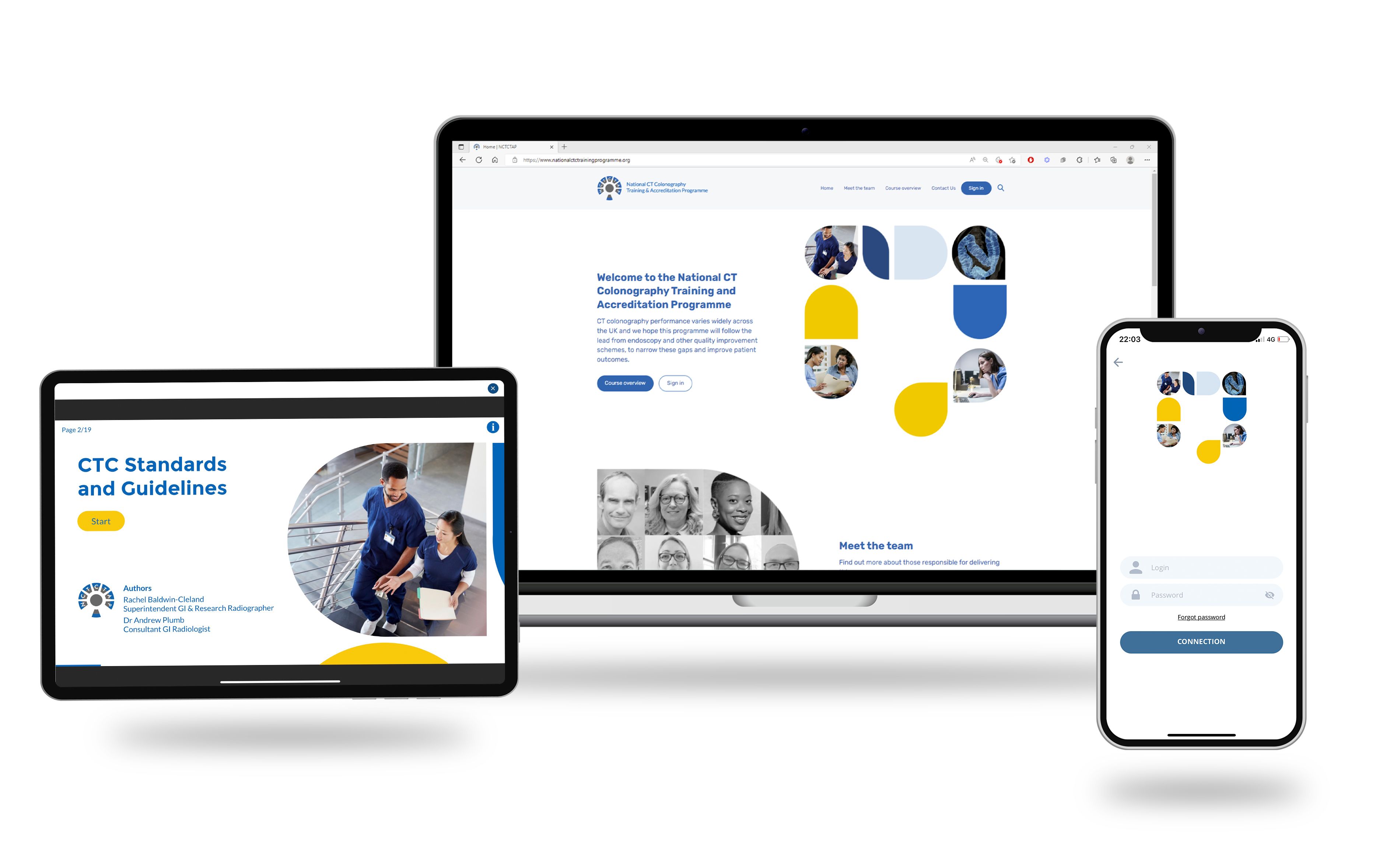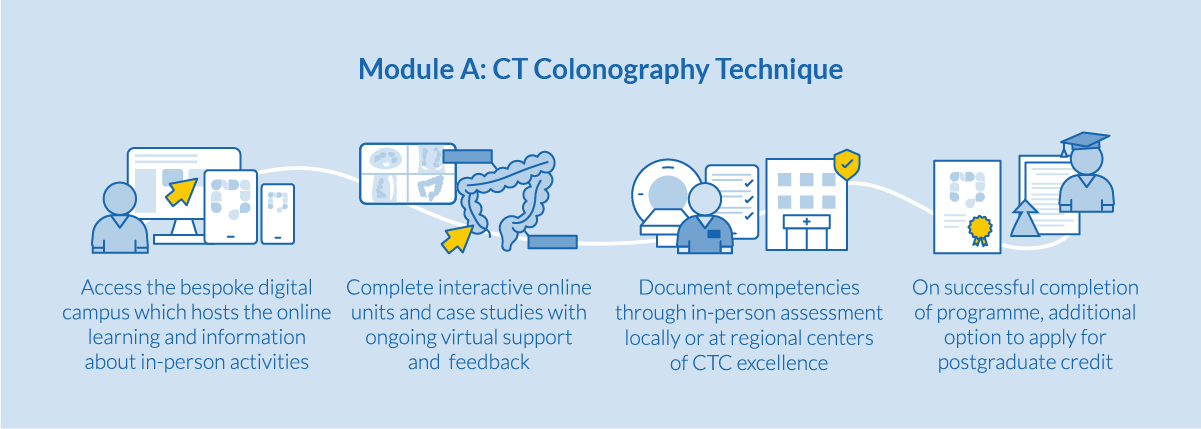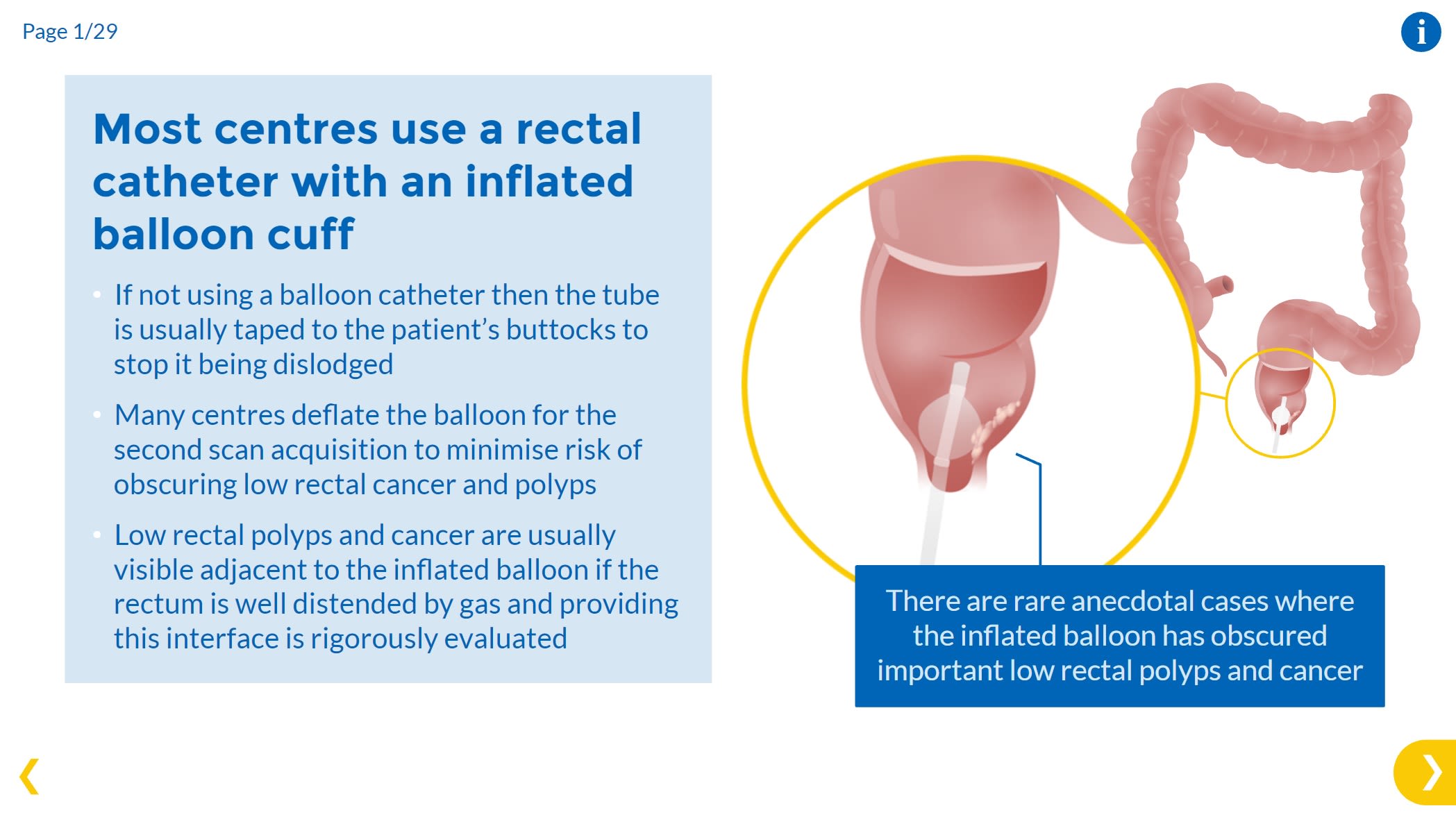
Careers
CT colonography training and accreditation
A new national training programme brings together radiographers and radiologists
This exciting new multi-professional programme has been created and validated in London under the supervision of leading CT Colonography (CTC) radiologists and radiographers.
Harnessing the experience of teaching CTC technique and interpretation from across the UK NHS centres of excellence, the National CT Colonography Training and Accreditation Programme (NCTCTAP) delivers the knowledge and skills to perform and interpret CTC safely and accurately.
Encompassing best practice CTC guidelines developed for the Society and College of Radiographers (SoR|CoR), Bowel Cancer Screening Programme (BCSP), and British Society of GI and Abdominal Radiology (BSGAR), the CTC training and accreditation programme combines face-to-face and remote learning, hosted on a bespoke digital campus.
The aim is to reduce the training burden on departments and help ensure reproducibly high quality, safe CTC examinations. The course objectives and outcomes enable those radiographers and radiologists successfully completing the programme to apply for credits towards a postgraduate certificate of training (Pg Cert), which supports role extension and career advancement, and in turn supports recruitment and retention in departments.
Beyond this, participants will join a CTC community focussed on improving the quality of CTC services to save patient lives through early diagnosis and safer practice. This community provides opportunities for role modelling, mentorship, advanced training and online performance monitoring with benchmarking.
The programme was launched with pump-prime funding from Health Education England (HEE) as part of the Covid-19 pandemic recovery plan in London, in order to help alleviate the endoscopy backlog and patient delays in undergoing vital cancer diagnosis. The emphasis at that stage was to ensure high CTC quality with an increase in CTC capacity, given the known wide variation in quality.
The programme was developed by a steering group representing NHS CTC teaching centres, SoR|CoR, BSGAR, HEE, and NHS England and Improvement. This team is supported by a multidisciplinary clinical advisory board, including CTC trainers from around the UK, surgeons, gastroenterologists and patient representatives.
“Patients will experience a high quality and safe CTC, regardless of where they have the test in the UK”
Diagnostic radiographer and Clinical Research Fellow Rachel Baldwin-Cleland from St Mark’s Hospital, London, is part of the NCTCTAP team. She said: “The training ensures radiographers are competent to perform CTC to the Best Practice Standards, taking new starters form level 1 to 2, and level 2s to level 3 in technique1. This national training programme will permit staff to transfer their knowledge and skills between departments without the need to retrain, which will reduce the drain on time and resources.”
Rachel added: “Narrowing of performance gaps and variation in approach will facilitate moves between NHS hospitals, enabling an easier transition for radiographers into a new position. This training will also ensure patients will experience a high quality and safe CTC, regardless of where they have the test in the UK”.
The NCTCTAP programme Module A - CTC Technique comprises 17 award-winning interactive training units, encompassing the patient journey beginning with referral to the completion of the CTC examination. Trainees will be able to easily document their competencies and reflections on their own ePortfolio via the digital campus. The online learning is supported by local trainers and external experts who provide support and mentorship for trainees as they progress through the programme.
Module A was successfully piloted in London and the Midlands, and is now being rolled out via centres of excellence across England with plans to include the rest of the UK, as per recommended practice2. It will be adopted as a national, standard training package involving CTC supervision, support and assessment. Training also includes spending time in a regional centre of excellence to see what good looks like and discuss how to implement and run a safe and effective CTC service.
Rachel explained: “We have seen 107 radiographers complete the training in London and the Midlands, along with 12 radiologists. Twenty-seven radiographers have become CTC trainers by completing our bespoke train-the-trainers course, and a further three radiographers have completed a reflective essay post-Module A and used this as recognised prior learning for credits with the University of Suffolk. Reactions have been very positive, and all constructive feedback during the pilot was used to make the programme more accessible, supportive and user friendly going forward”.
Example page from the online training units
Example page from the online training units
The module is designed as a co-professional resource for radiographers and radiology registrars involved with CTC services, and in December 2022 the training was awarded CoR short course accreditation status. BSGAR has commissioned the Module A training units, through HEE funding, and the roll out of Module A access will begin in June this year for radiology registrars to meet the requirements of the RCR curriculum.
The next step is the development of Module B – CTC Interpretation, in which, again uniquely, radiographers and radiologists will undertake the same training. This innovative approach will be a step change in the role and training of GI radiographers for complex imaging interpretation.
Pg Certs in CTC reporting have previously been offered by a few universities across the country but are limited in capacity. Rachel said: “This is in the final development phase at the moment and as part of my PhD looking at CTC training and education, we will be observing the impact the training has, and how radiographers respond to this type of training compared to radiologists.
“We will soon be looking for radiographers to join the research study (PERFECTS-2) and undertake CTC interpretation training in this new manner.”
Rachel explained: “Role extension is increasing within the radiography profession and very few studies have benchmarked, after the same training, the ability of radiographers and radiologists reporting CTC on a large scale. We expect that radiographers will respond to the training in the same manner as radiologists and increase their sensitivity from baseline testing to final test in the same way as radiologists”.
Both modules will help ensure a level playing field of training across the country and allow more sustainable access to much needed CTC training capacity.
Scan or click the QR code to access the NCTCTAP programme website
Scan or click the QR code to access the NCTCTAP programme website
Find out more
To find out more about CTC training, visit the NCTCTAP programme website or if you would like to know more about the PERFECTS-2 research study, contact Rachel at r.baldwin@nhs.net
Image credits:
1225228051/ mr.suphachai praserdumrongchai/ iStock / Getty Images Plus
References
1. The Society and College of Radiographers. National Best Practice Guidelines for the CT Colonography Service. The CT Colonography Radiographer Education Development Group. 2015. Accessed on 27/04/2023 from https://www.sor.org/learning-advice/professional-body-guidance-and-publications/documents-and-publications/policy-guidance-document-library/national-best-practice-guidelines-for-the-ct-colon
2. The Royal College of Radiologists. Computed tomography colonography and lower gastrointestinal cancer pathways: planning for the next decade. London: The Royal College of Radiologists, 2023. Accessed on 03/05/2023 from: https://www.rcr.ac.uk/system/files/publication/field_publication_files/computed_tomography_colonography_and_lower_gastrointestinal_cancer_pathways_-_planning_for_the_next_decade.pdf
Now read...







